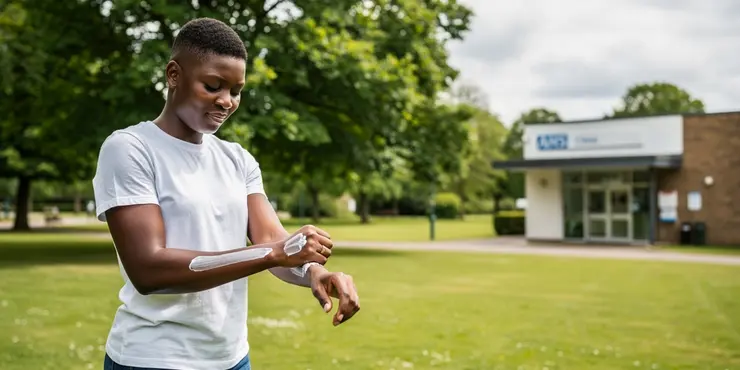
Find Help
More Items From Ergsy search
-
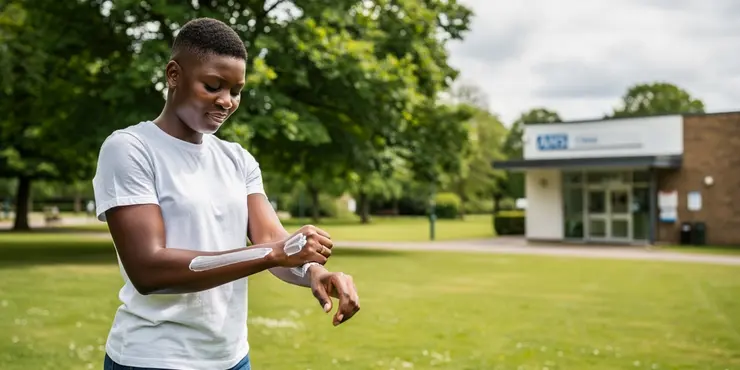
Can dark-skinned individuals get sunburned?
Relevance: 100%
-
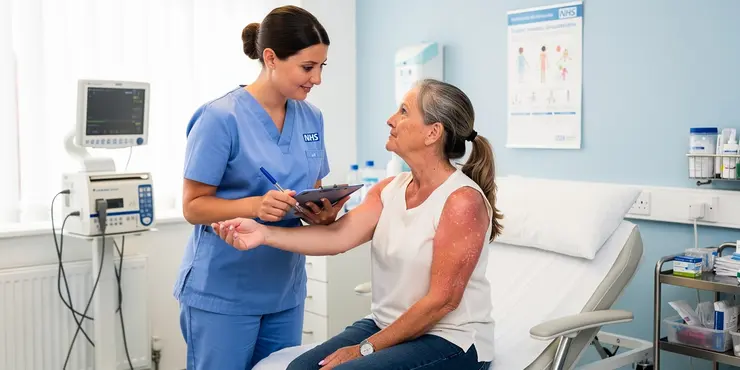
What is Sunburn?
Relevance: 48%
-
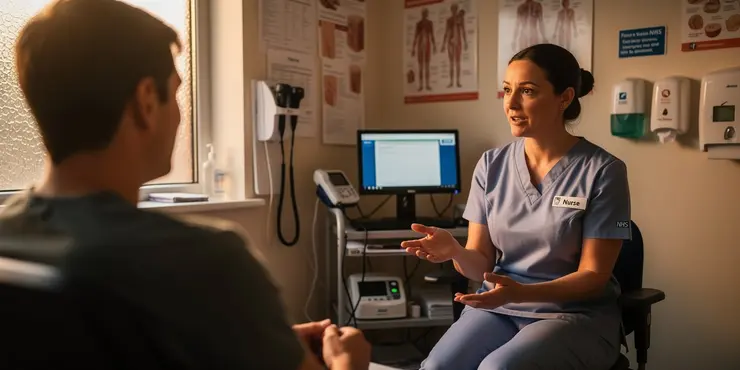
What is sunburn?
Relevance: 38%
-
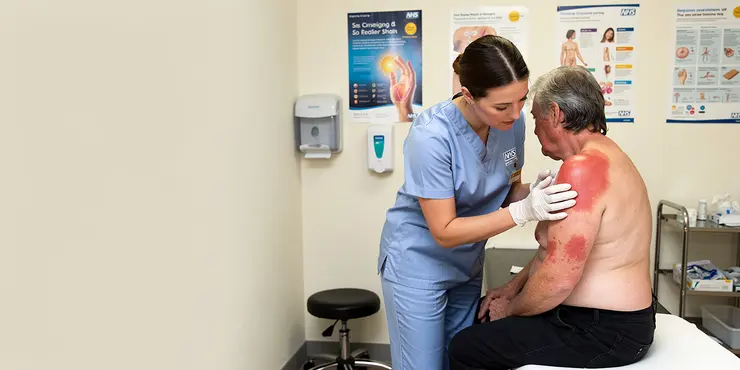
What are the symptoms of sunburn?
Relevance: 37%
-
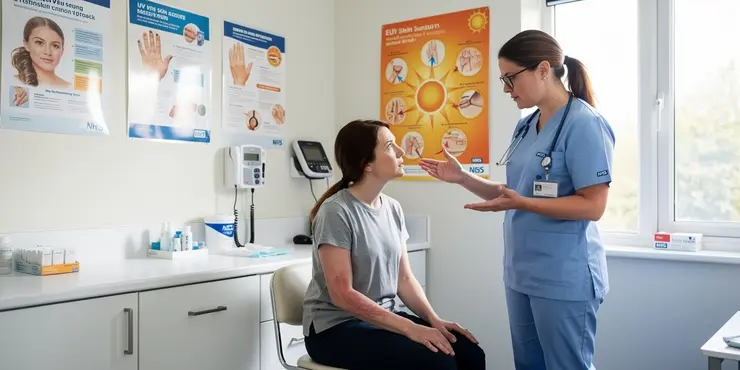
What causes sunburn?
Relevance: 37%
-
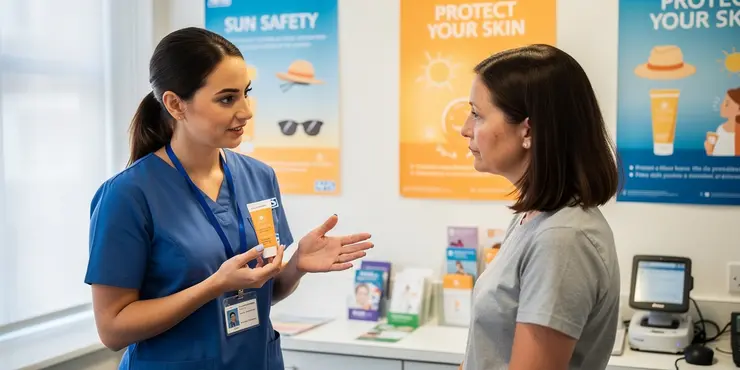
Can sunburn be prevented?
Relevance: 36%
-
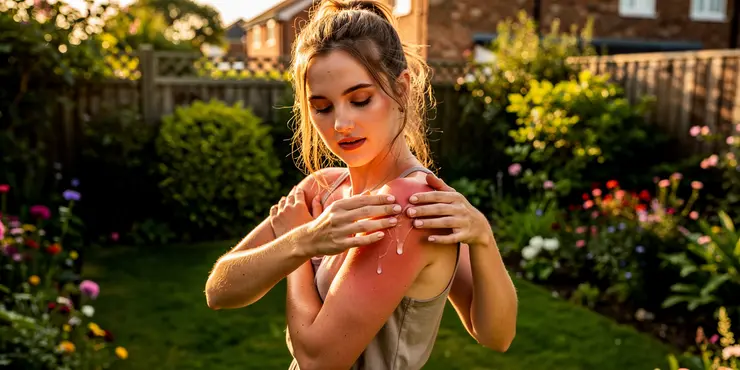
Self care - sunburn
Relevance: 36%
-
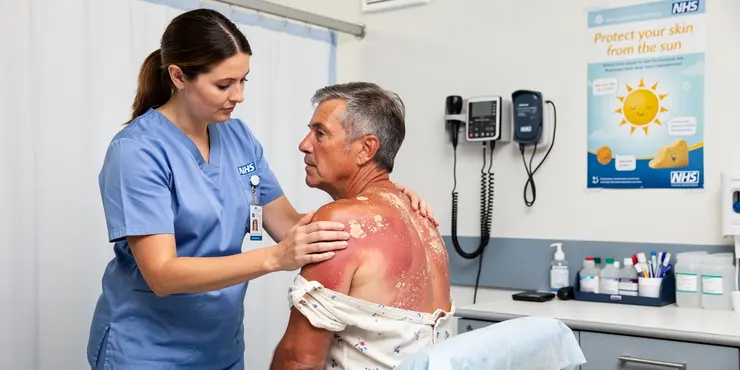
Can sunburn turn into a tan?
Relevance: 36%
-
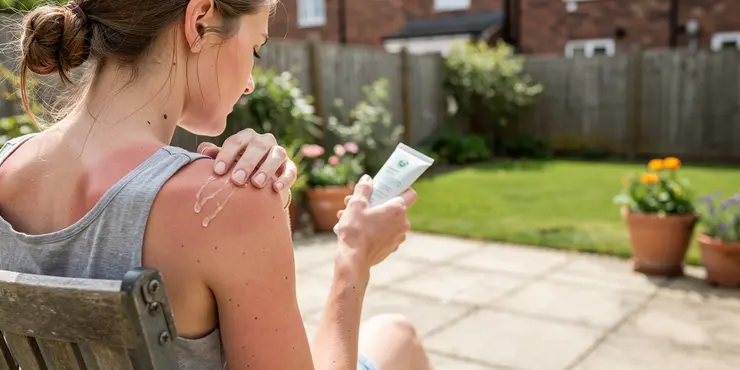
Self care - sunburn
Relevance: 36%
-
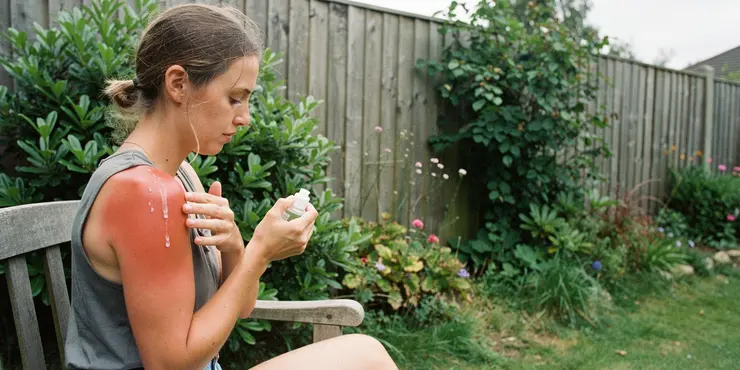
How is sunburn treated?
Relevance: 36%
-
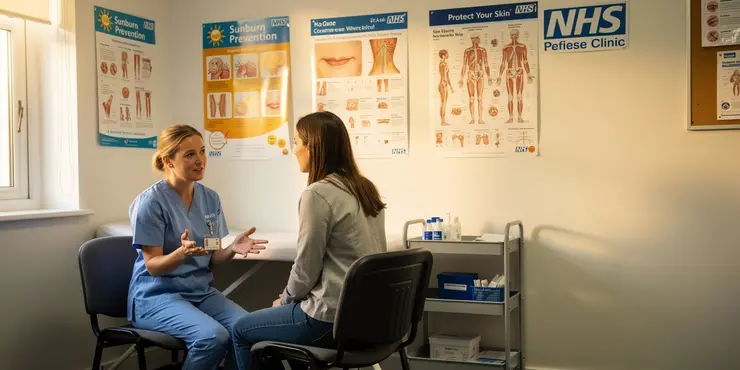
Are some people more prone to sunburn?
Relevance: 35%
-
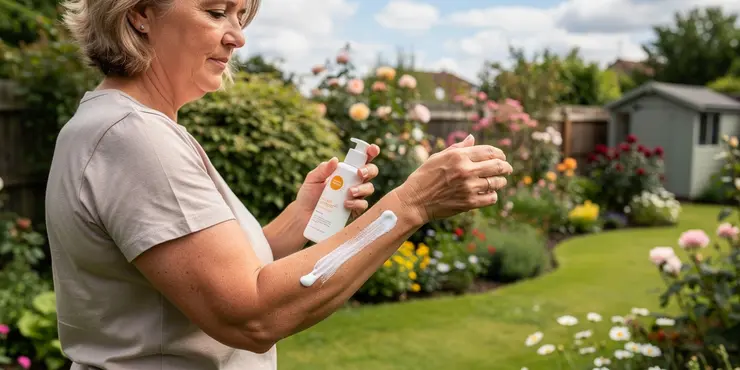
What are the long-term effects of sunburn?
Relevance: 35%
-

Can sunburns cause permanent damage?
Relevance: 35%
-
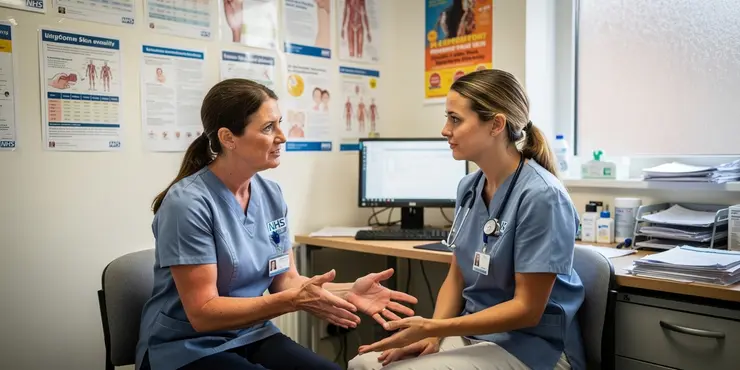
How long does it take for sunburn to appear?
Relevance: 34%
-
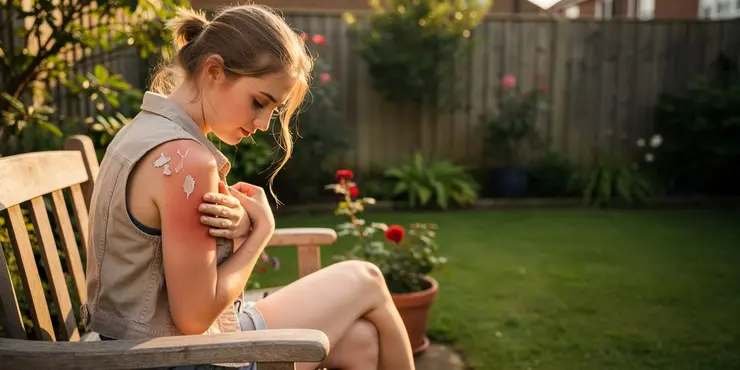
Is peeling a normal part of sunburn recovery?
Relevance: 34%
-
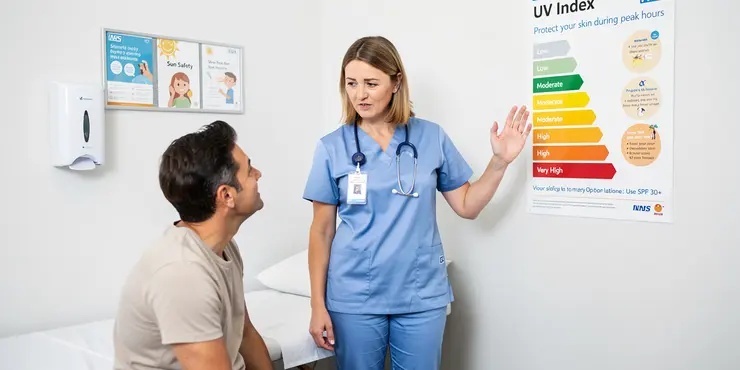
At what time of day is the sunburn risk highest?
Relevance: 33%
-
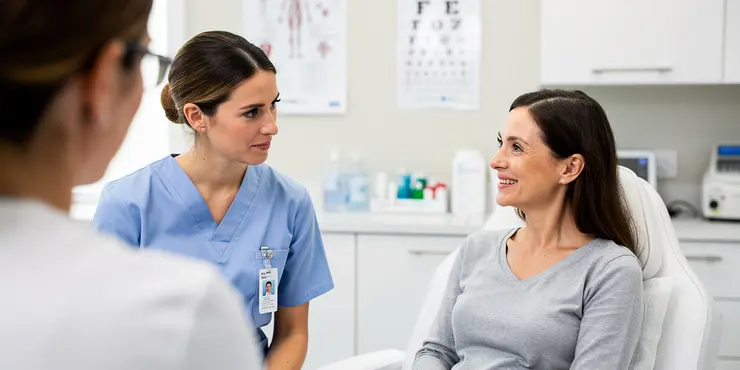
Does tanning lotion prevent sunburn?
Relevance: 32%
-
Does tanning on sunbeds reduce the risk of future sunburns?
Relevance: 30%
-

What SPF level is recommended to prevent sunburn?
Relevance: 29%
-
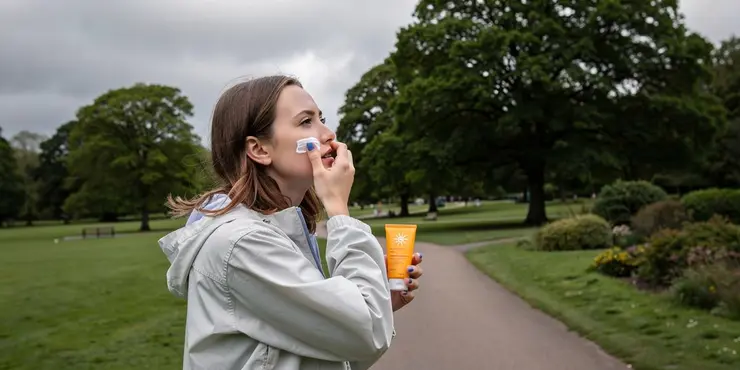
Is it possible to get sunburned on cloudy days?
Relevance: 24%
-
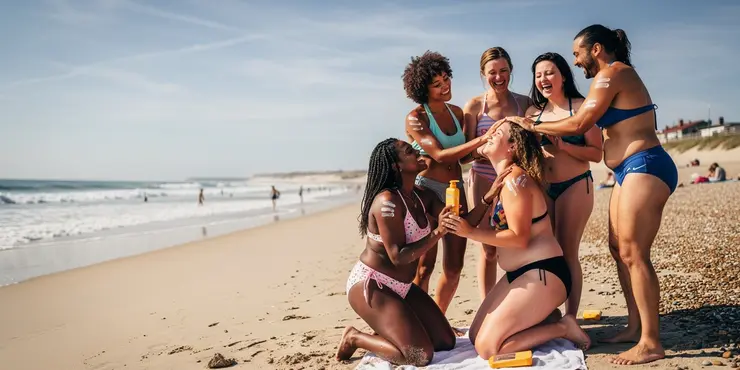
Does water reflect UV rays, increasing the risk of sunburn?
Relevance: 21%
-
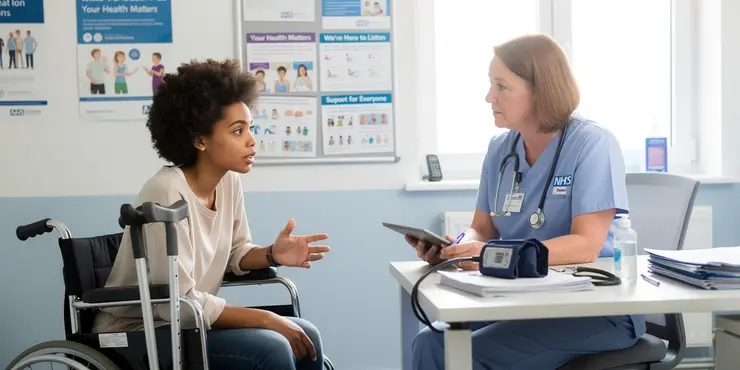
Are there grants specifically for individuals with disabilities?
Relevance: 20%
-
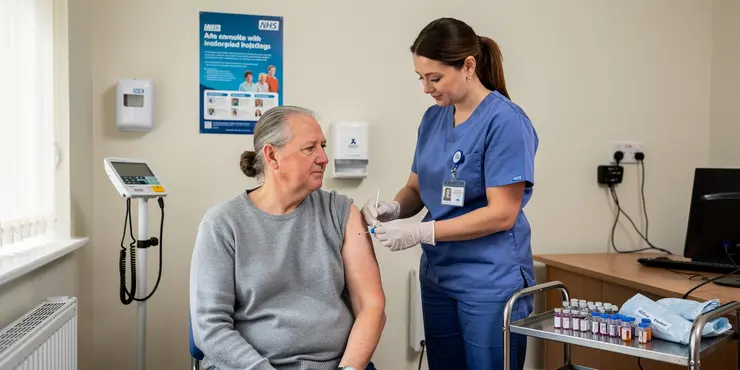
Is the flu jab necessary for healthy individuals?
Relevance: 18%
-
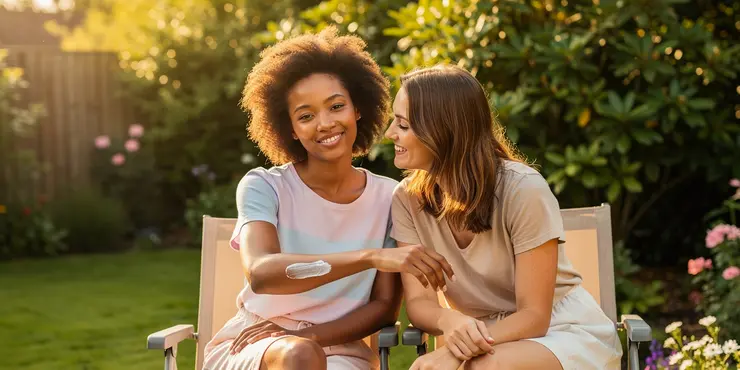
Why do some people not burn as easily as others?
Relevance: 18%
-
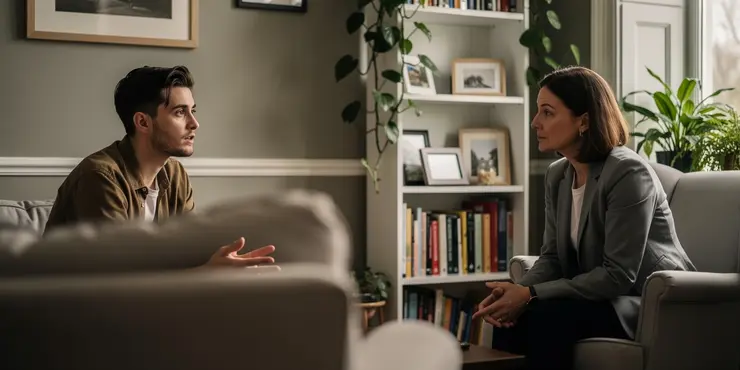
Can therapy help individuals with ADHD?
Relevance: 18%
-
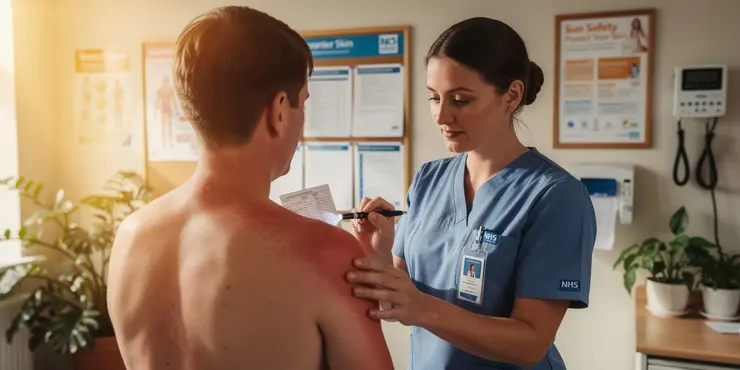
What to do if you're sunburnt
Relevance: 18%
-
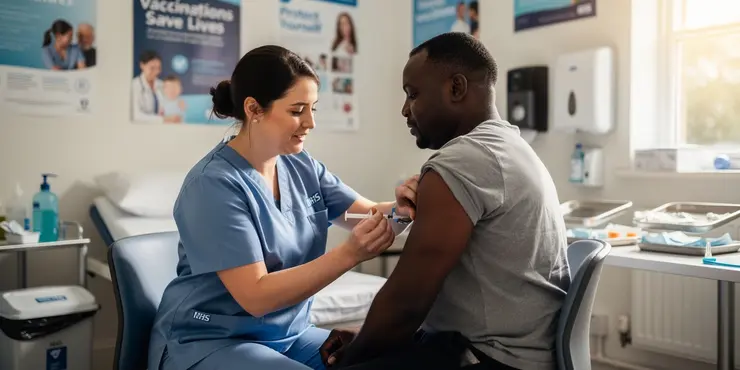
What are the guidelines for meningitis vaccination for HIV-infected individuals?
Relevance: 17%
-

Can pregnant individuals receive the meningococcal vaccine?
Relevance: 17%
-
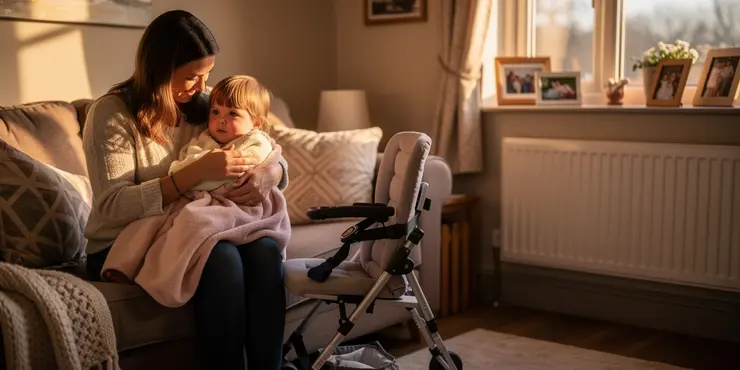
What support is available for families of individuals with PIMD?
Relevance: 17%
-
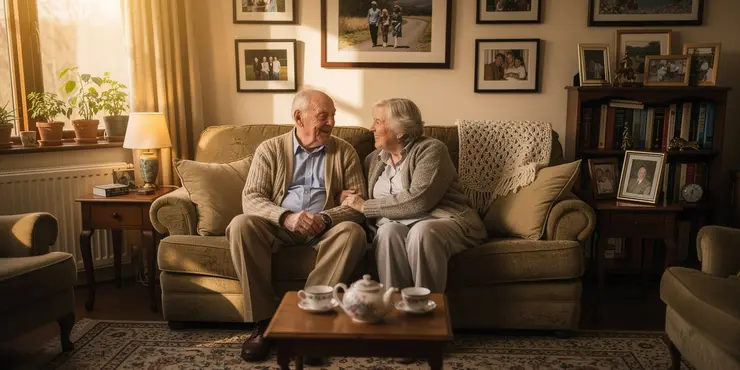
Why are elder individuals often targeted by scammers?
Relevance: 17%
-

Can live-in care support individuals with dementia?
Relevance: 17%
-
Should individuals with certain medical conditions avoid aspirin?
Relevance: 16%
-

How might a wealth tax affect wealthy individuals?
Relevance: 16%
-

Can Wegovy help with weight loss in non-obese individuals?
Relevance: 16%
-
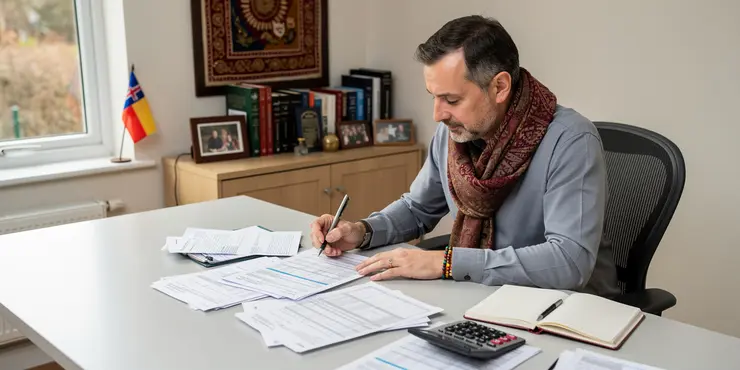
How does inheritance tax affect non-UK domiciled individuals?
Relevance: 16%
-

Can individual actions significantly impact overall water loss?
Relevance: 15%
-

Can non-diabetic individuals use Ozempic for weight loss?
Relevance: 15%
-
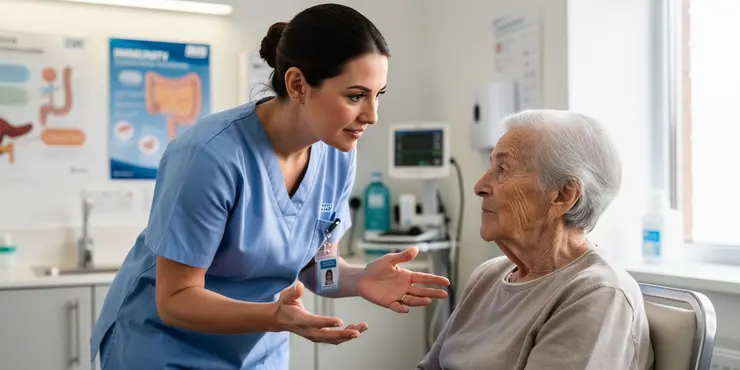
Can gut health influence the immune system in aging individuals?
Relevance: 15%
-

How can individuals help reduce sewage pollution?
Relevance: 15%
-

What support is available for individuals diagnosed with bowel cancer?
Relevance: 15%
Can Dark-Skinned Individuals Get Sunburned?
It is a common misconception that individuals with dark skin are immune to sunburn. While it is true that darker skin has more melanin, which provides some level of protection against ultraviolet (UV) radiation, it is not a complete safeguard. Dark-skinned individuals are indeed less likely to burn as quickly or severely as those with lighter skin, but they are still susceptible to sun-related skin damage.
Understanding Melanin and UV Protection
Melanin is the pigment that gives skin its color, and its abundance in darker skin offers a higher natural SPF (Sun Protection Factor), ranging from 5 to 13. This means that dark skin naturally filters out a proportion of UV radiation, reducing the penetration of harmful rays. However, even with this natural protection, UV rays can cause harm if exposure is prolonged.
Risks of Sun Exposure
Despite the partial protection offered by melanin, dark-skinned individuals can experience sunburn if exposed to intense UV radiation without adequate protection. The signs of sunburn might not be as apparent as on lighter skin, but the damage might still occur beneath the surface. In addition to immediate discomfort, repeated and prolonged exposure to the sun can lead to premature skin aging, hyperpigmentation, and an increased risk of skin cancer, including melanoma, which can be more deadly in black and Asian populations due to later detection.
Skin Cancer Awareness
Skin cancer in darker skin tones often goes undetected until the later stages, as signs might not be apparent and there's less awareness about the risk. Regular checks and awareness of changes in the skin are crucial. Dark-skinned individuals should particularly watch for unusual or changing moles and other growths, as early detection is key to effective treatment.
Sun Protection Recommendations
Regardless of skin tone, it is important to take measures to protect against UV radiation. Dark-skinned individuals should apply sunscreen with at least SPF 30, encompassing both UVB and UVA protection. Broad-spectrum sunscreens can help prevent sunburn and reduce the risks of skin cancer and premature aging. Wearing protective clothing, seeking shade, and avoiding the sun during peak hours (11 a.m. to 3 p.m.) are also effective strategies.
Conclusion
In summary, while dark skin provides some natural protection against the sun’s harmful rays, it does not make one immune to sunburn or related health risks. Understanding and implementing sun safety practices is important for everyone, regardless of skin color. As awareness grows, ensuring equal access to sun protection resources and education is crucial in the UK and beyond.
Can People with Dark Skin Get Sunburned?
Some people think that if you have dark skin, you can't get sunburned. But this is not true. Dark skin has more melanin, which helps protect against the sun. However, it does not stop sunburn completely. People with dark skin burn less easily than those with light skin, but they can still get sunburned.
What is Melanin and How Does it Help?
Melanin gives your skin its color. Having more melanin means your skin has some natural protection from the sun. This protection is like wearing sunscreen with SPF between 5 and 13. Although melanin helps, too much time in the sun can still hurt your skin.
Dangers of Too Much Sun
Even with melanin's help, dark skin can get damaged by too much sun. Sunburn might not be easy to see on dark skin, but it can still happen underneath. Too much sun can also make your skin get old faster, change color, and increase the chance of skin cancer. In some cases, skin cancer can be very serious, especially if found late.
Knowing About Skin Cancer
Skin cancer on dark skin can be hard to notice until it is serious. This is why it is important to check your skin often. Look for unusual or changing spots, especially moles. Finding skin cancer early makes it easier to treat.
How to Protect Your Skin from the Sun
No matter your skin color, protecting against the sun is important. People with dark skin should use sunscreen with at least SPF 30. This helps protect against sunburn, skin cancer, and early aging. Wear clothes that cover your skin, stay in the shade, and avoid being in the sun between 11 a.m. and 3 p.m. when it’s very strong.
Conclusion
Dark skin helps protect from the sun, but it doesn’t stop sunburn or other dangers. Knowing how to stay safe in the sun is important for everyone. It’s also important that everyone has access to sun safety tips and products in the UK and everywhere else.
Frequently Asked Questions
Can dark-skinned individuals get sunburned?
Yes, dark-skinned individuals can get sunburned, although it may be less common than in those with lighter skin tones.
Why do dark-skinned individuals get sunburned less often?
Darker skin contains more melanin, which provides some protection against UV rays, reducing the likelihood of sunburn.
Are dark-skinned people immune to sunburn?
No, dark-skinned people are not immune to sunburn. They are still susceptible to UV damage.
What are the symptoms of sunburn on darker skin?
Symptoms can include redness, swelling, pain, and sometimes darker pigmentation or peeling.
How long does it take for a dark-skinned person to get sunburned?
It varies, but dark-skinned individuals can burn in 30 minutes to a few hours of intense sun exposure.
Does sunburn in dark-skinned individuals look different?
Yes, it may not appear red but could present as darker spots, irritation, or peeling.
What are the long-term effects of sunburn on dark skin?
Long-term effects can include increased risk of skin cancer, hyperpigmentation, and premature aging.
Should dark-skinned individuals use sunscreen?
Yes, they should use broad-spectrum sunscreen to protect against UV damage and skin cancer.
What SPF is recommended for dark-skinned individuals?
A minimum of SPF 30 is recommended for dark-skinned individuals.
Can darker skin reduce vitamin D production?
Yes, darker skin can reduce vitamin D synthesis, so balanced sun exposure is important.
Is skin cancer a concern for dark-skinned individuals?
Yes, dark-skinned individuals can get skin cancer, often with more aggressive forms.
How can dark-skinned individuals prevent sunburn?
By using sunscreen, wearing protective clothing, and seeking shade during peak sun hours.
Can sunburn be treated the same way in dark and light skin?
Yes, treatments like moisturizers, cool baths, and NSAIDs for pain can be effective for both.
Do dark-skinned individuals need more sunscreen for the same protection?
No, they need the same amount, but should ensure even coverage and reapplication as needed.
Can sunburn lead to other skin problems in dark-skinned individuals?
Yes, it can cause hyperpigmentation, scarring, and aggravate conditions like melasma.
What time of day is sun exposure most harmful?
Between 10 AM and 4 PM when UV rays are strongest.
Do dark-skinned children need sunscreen?
Yes, children of all skin tones should use sunscreen to protect against UV harm.
Can tanning protect against sunburn in dark-skinned individuals?
A tan offers minimal protection. Sunscreen is always recommended regardless of skin tone.
Does clothing affect sunburn risk in dark-skinned people?
Yes, wearing protective clothing can significantly reduce the risk of sunburn.
Are there any misconceptions about sunburn and dark skin?
Yes, a common misconception is that dark skin does not need sun protection, which is untrue.
Can people with dark skin get sunburn?
Yes, people with dark skin can still get sunburn.
Sunburn happens when you stay in the sun for too long.
Use sunscreen and wear a hat to protect your skin.
If you get sunburn, you can use aloe vera gel to help.
Yes, people with dark skin can get sunburned. It might not happen as often as it does for people with light skin.
Why do people with dark skin get sunburned less?
People with dark skin have more of a thing called melanin. Melanin helps protect the skin from sunburn. It is like having a stronger shield.
If you have dark skin, the melanin means you do not get sunburned as easily. But everyone should still be careful in the sun. Wear hats and use sunscreen to stay safe!
People with darker skin have more melanin. Melanin helps protect them from the sun. This means they are less likely to get a sunburn.
Can people with dark skin get sunburn?
Dark skin can still get sunburned. It just takes more time in the sun.
When you go outside, use sunscreen. Hats and shirts can also help protect your skin.
If you stay in the sun too long, your skin can hurt or peel. So be careful and take breaks in the shade.
If reading is hard, ask someone you trust to help you. There are also apps that can read text out loud.
People with dark skin can still get sunburned. The sun can still hurt their skin.
What happens when dark skin gets sunburned?
Dark skin can get hurt by the sun. Here are some signs:
- Skin feels hot or sore.
- Skin might look darker or feel tight.
- Blisters might show up.
- Skin peels after a few days.
If you feel unsure, talk to an adult or a doctor. Using sunscreen, wearing hats, or staying in the shade can help protect your skin.
Signs that something is wrong can be:
- Red skin
- Swelling
- Pain
- Dark or peeling skin
If you need help understanding, try asking someone to explain it to you or use a tool that reads text out loud.
How long before dark-skinned people get sunburn?
Sunburn is when your skin gets hurt from being in the sun too long. People with dark skin take longer to get sunburn because their skin has more protection.
It's still important to be careful in the sun. Use sunscreen, wear a hat, and stay in the shade if you can.
If you are not sure or have questions, you can ask someone you trust for help. Apps on phones or the internet can remind you to take breaks from the sun.
People with dark skin can get sunburned. It can happen in just 30 minutes or a few hours if the sun is strong.
Does Sunburn Look Different on Dark Skin?
Can people with dark skin get sunburn? Yes, they can.
Does it look different from sunburn on light skin? Yes, it might look a bit different.
Sunburn on dark skin can make the skin feel sore or itchy.
The skin might also get darker or change color.
If you are not sure if you have sunburn, ask a grown-up or a doctor to help you.
Yes, it might not look red. It can look like dark spots, can feel itchy, or the skin might peel.
What happens to dark skin after a long time with sunburn?
If you have dark skin and get sunburned, it can still hurt your skin later. Here’s what can happen:
- Skin Damage: Sunburn can hurt your skin cells.
- Changes in Skin Color: Your skin might get spots or change color.
- Wrinkles: Sunburn can make skin look old faster.
- Skin Cancer: It's rare, but too much sun can cause skin cancer.
To help your skin, use sunscreen, wear a hat, and stay in the shade. If your skin is hurt by the sun, talk to a doctor or a nurse.
Over time, too much sun can lead to skin problems. It can make it easier to get skin cancer. It can also cause dark patches and make your skin look older faster.
Do people with dark skin need sunscreen?
Sunscreen helps protect your skin from the sun. Even if you have dark skin, the sun can still harm you. Using sunscreen keeps your skin safe. Try to use sunscreen every day, especially when you are outside. This helps stop sunburn and skin damage.
Here are some tips to help you use sunscreen:
- Put on sunscreen before you go outside.
- Use sunscreen with an SPF of at least 30.
- Reapply sunscreen every 2 hours, or after swimming or sweating.
You can ask a family member or friend to help you put on sunscreen if needed.
Yes, they should use sunscreen that protects against the sun's rays. This helps stop skin damage and skin cancer.
What SPF should people with dark skin use?
People with dark skin should use sunscreen with at least SPF 30.
Does having darker skin affect how much vitamin D you make?
Yes, people with darker skin may make less vitamin D from the sun. Getting the right amount of sun is important.
Can people with dark skin get skin cancer?
Yes, people with dark skin can get skin cancer, too. It's not as common, but it can happen. Everyone should be careful in the sun.
Tips to stay safe:
- Wear sunscreen to protect your skin.
- Stay in the shade during the sunniest parts of the day.
- Wear a hat and sunglasses when outside.
- Check your skin for any changes or new spots.
Using these tips can help keep your skin safe and healthy.
Yes, people with dark skin can get skin cancer. It can sometimes be more serious.
What can people with dark skin do to stop sunburn?
To stay safe in the sun:
- Put on sunscreen.
- Wear clothes that cover your skin.
- Find shade when the sun is very strong.
Can We Treat Sunburn the Same for All Skin Colors?
Yes, using creams, cool baths, and medicines for pain can help both.
Do people with dark skin need more sunscreen to stay safe?
People with dark skin still need sunscreen to keep their skin safe from the sun. Sun can hurt everyone’s skin over time.
Sunscreen helps protect against sunburn and skin damage.
It is important for everyone to wear sunscreen when spending time outside, whether they have light or dark skin.
Ask an adult to help you choose the right sunscreen and apply it properly.
Set a timer or use an app to remind you to reapply sunscreen every two hours. This helps keep your skin safe.
No, they need the same amount. Make sure to cover everything evenly and put it on again when you need to.
Can getting sunburn cause more skin problems for people with dark skin?
Sunburn might hurt your skin, no matter how dark it is. It's important to protect your skin from the sun.
Use sunscreen and wear hats or long sleeves when it's sunny. This can help keep your skin safe.
If you get a sunburn, talk to a doctor or nurse. They can help you take care of your skin.
Yes, it can make the skin darker, leave marks, and make skin problems like melasma worse.
When is the sun most dangerous for your skin?
The sun can hurt your skin. The sun is most dangerous in the middle of the day. This is from 10 a.m. to 4 p.m. You should be careful during this time.
Here are some tips:
- Wear a hat and sunglasses to protect your face and eyes.
- Use sunscreen to keep your skin safe.
- Try to stay in the shade when you can.
Ask an adult if you need help or have questions.
The sun is very strong between 10 in the morning and 4 in the afternoon.
Do children with dark skin need sunscreen?
Yes, children with dark skin need sunscreen too.
The sun can hurt everyone's skin. Sunscreen helps protect it.
When you go outside, put sunscreen on. This keeps your skin safe from the sun.
You can also wear a hat and stay in the shade to help protect your skin.
Yes, kids with all different skin colors should use sunscreen. It helps protect their skin from the sun.
Does tanning help prevent sunburn for people with dark skin?
Having dark skin means there is more natural protection against the sun. But remember, everyone's skin can burn if they stay in the sun too long.
Tanning can make your skin a bit darker over time. For people with dark skin, tanning might help a little, but it won't stop sunburn completely.
Use sunscreen to protect your skin. Wear hats and clothes to cover up if you are outside for a long time.
If you need help reading, you can ask someone to read it with you or use a tool that reads the words out loud.
A tan does not protect you much. It is important to use sunscreen, no matter the color of your skin.
Can clothes change how the sun affects dark skin?
Wearing the right clothes can help stop you from getting sunburn.
Do people have wrong ideas about sunburn and dark skin?
Some people think dark skin can't get sunburned. But this is not true. Dark skin can get burned by the sun too.
Here are some tips to help remember:
- Wear sunscreen when you go outside.
- Put on a hat to protect your face.
- Stay in the shade when the sun is very strong.
You can also use drawings or pictures to remember these tips better.
People sometimes think that dark skin doesn't need sun protection. This is not true.
Useful Links
This website offers general information and is not a substitute for professional advice.
Always seek guidance from qualified professionals.
If you have any medical concerns or need urgent help, contact a healthcare professional or emergency services immediately.
Some of this content was generated with AI assistance. We’ve done our best to keep it accurate, helpful, and human-friendly.
- Ergsy carfully checks the information in the videos we provide here.
- Videos shown by Youtube after a video has completed, have NOT been reviewed by ERGSY.
- To view, click the arrow in centre of video.
- Most of the videos you find here will have subtitles and/or closed captions available.
- You may need to turn these on, and choose your preferred language.
- Go to the video you'd like to watch.
- If closed captions (CC) are available, settings will be visible on the bottom right of the video player.
- To turn on Captions, click settings .
- To turn off Captions, click settings again.
More Items From Ergsy search
-

Can dark-skinned individuals get sunburned?
Relevance: 100%
-

What is Sunburn?
Relevance: 48%
-

What is sunburn?
Relevance: 38%
-

What are the symptoms of sunburn?
Relevance: 37%
-

What causes sunburn?
Relevance: 37%
-

Can sunburn be prevented?
Relevance: 36%
-

Self care - sunburn
Relevance: 36%
-

Can sunburn turn into a tan?
Relevance: 36%
-

Self care - sunburn
Relevance: 36%
-

How is sunburn treated?
Relevance: 36%
-

Are some people more prone to sunburn?
Relevance: 35%
-

What are the long-term effects of sunburn?
Relevance: 35%
-

Can sunburns cause permanent damage?
Relevance: 35%
-

How long does it take for sunburn to appear?
Relevance: 34%
-

Is peeling a normal part of sunburn recovery?
Relevance: 34%
-

At what time of day is the sunburn risk highest?
Relevance: 33%
-

Does tanning lotion prevent sunburn?
Relevance: 32%
-
Does tanning on sunbeds reduce the risk of future sunburns?
Relevance: 30%
-

What SPF level is recommended to prevent sunburn?
Relevance: 29%
-

Is it possible to get sunburned on cloudy days?
Relevance: 24%
-

Does water reflect UV rays, increasing the risk of sunburn?
Relevance: 21%
-

Are there grants specifically for individuals with disabilities?
Relevance: 20%
-

Is the flu jab necessary for healthy individuals?
Relevance: 18%
-

Why do some people not burn as easily as others?
Relevance: 18%
-

Can therapy help individuals with ADHD?
Relevance: 18%
-

What to do if you're sunburnt
Relevance: 18%
-

What are the guidelines for meningitis vaccination for HIV-infected individuals?
Relevance: 17%
-

Can pregnant individuals receive the meningococcal vaccine?
Relevance: 17%
-

What support is available for families of individuals with PIMD?
Relevance: 17%
-

Why are elder individuals often targeted by scammers?
Relevance: 17%
-

Can live-in care support individuals with dementia?
Relevance: 17%
-
Should individuals with certain medical conditions avoid aspirin?
Relevance: 16%
-

How might a wealth tax affect wealthy individuals?
Relevance: 16%
-

Can Wegovy help with weight loss in non-obese individuals?
Relevance: 16%
-

How does inheritance tax affect non-UK domiciled individuals?
Relevance: 16%
-

Can individual actions significantly impact overall water loss?
Relevance: 15%
-

Can non-diabetic individuals use Ozempic for weight loss?
Relevance: 15%
-

Can gut health influence the immune system in aging individuals?
Relevance: 15%
-

How can individuals help reduce sewage pollution?
Relevance: 15%
-

What support is available for individuals diagnosed with bowel cancer?
Relevance: 15%


